a&e features
Gay Holocaust survivor shares life lessons
Alfred Munzer laments ongoing religious, racial hatred
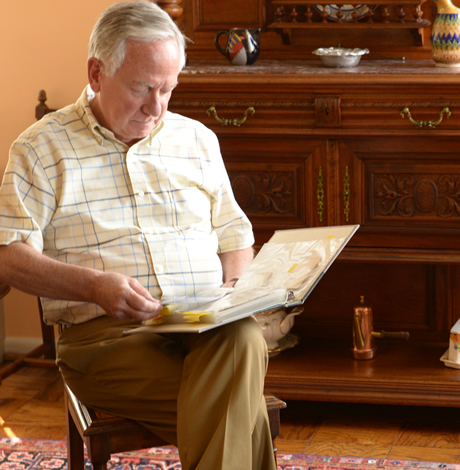
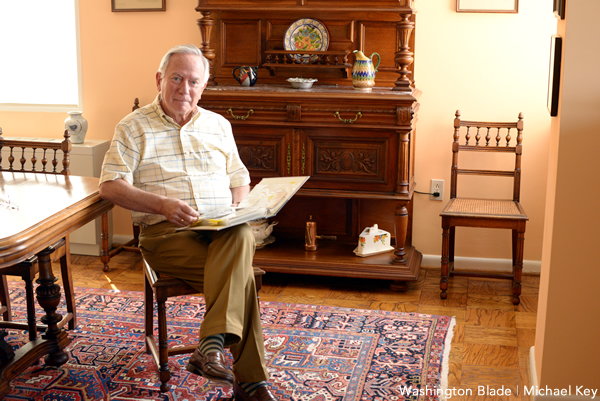
Alfred Munzer in his Van Ness apartment. Now retired from his medical career, Munzer devotes much of his time to the Holocaust Museum. (Washington Blade photo by Michael Key)
First Person 2015 Series: Al Munzer
Conversation with a Holocaust Survivor
Wednesday, July 29
11 a.m.
U.S. Holocaust Memorial Museum
100 Raoul Wallenberg Place, S.W.
Free
No registration required
Although the odds were not favorable for Alfred Munzer in the circumstances surrounding his birth, in many ways, he ended up being the luckiest member of his family.
He’s the youngest of three children of Simcha and Gisele Munzer, a family of Jewish immigrants from what is now Poland. His parents were childhood sweethearts and were raising two daughters, Eva (born in July 1936) and Leah (born in November 1938) in the Hague, Netherlands. After World War I, anti-Semitism was rampant in their native land and opportunities were limited, so they moved to Holland where there was a substantial population of Jews, some of whom were from families that had been there since the 15th century. Simcha ran a men’s tailoring business.
When Gisele discovered she was expecting a third child — the pregnancy was unplanned — an abortion was advised and, as Munzer tells it today, his mother was told that, “it would be immoral to bring another Jewish life into the world.” Although not especially religious, she was inspired by the Old Testament story of Hannah, the childless woman who vows to God that if she is given a son, she will give him back to God. Her wish is granted with the birth of Samuel.
Munzer, now 73, was born on Nov. 23, 1941. Before he reached his first birthday, in July of 1942, Germans began mass deportations of nearly 100,000 Jews from the occupied Netherlands to the east, primarily Auschwitz, a network of Nazi concentration camps in German-annexed regions that had previously been part of Poland. It marked the beginning of a harrowing season for his family.
Munzer says growing up, he was often reminded of the circumstances around which he was born.
“Any time I was bad growing up, my mother would remind me of this, how she had prayed to God and requested a son,” Munzer says. “She indoctrinated me with this. It was made very clear that she had made the same pledge as Hannah and that I was here in service of God ultimately.”
It’s one of many biographical stories Munzer will share on Wednesday, July 29 when he does another installment of the Holocaust Museum’s First Person program in which survivors are interviewed about their life experiences. Since retiring from his career as an internist and pulmonologist last year, Munzer has become increasingly active as a volunteer at the museum. The program is free.
Having shared his life story many times over the years, first at an artistic event in Woodstock, N.Y., in the early 1980s, Munzer says it’s important that his story and those of other Holocaust survivors continue to be told.
“The angle I usually take is that even in a sea of evil, it is possible for people to do the right thing and stand up for what is right,” he says.
Unlike, for instance, the Anne Frank family, the Munzers thought they’d fare better if they went into hiding separately. Munzer’s two sisters went to live with a Catholic family. Simcha Munzer had received a notice to report for so-called labor duty, essentially a one-way ticket to a concentration camp, but was able to delay it by first having a hernia operation he’d been putting off and later faking a suicide attempt. Joined by Gisele at a Jewish psychiatric hospital where she was pretending to be a nurse’s aide, the two were eventually deported, in early 1943, to Vught Concentration Camp and then a year later to Auschwitz where they were separated.
Gisele had sold the family’s possessions. Neighbors kept some items such as a silver candelabra and fire dragon puppet that are now in Munzer’s Van Ness apartment where he’s lived for about 25 years with his husband, Joel Wind. Though only married for a year and a half, the two have been together since they met at Bet Mishpachah, a local LGBT-affirming synagogue where Munzer sometimes preaches, in 1980.
Things quickly turned dark for the family. The husband of the family raising Munzer’s two older sisters turned out to be a Nazi sympathizer. He denounced his wife and the two girls and all three were arrested and sent to the Westerbork transit camp. On Feb. 8, 1944, Eva, 8, and Leah, 6, were deported to Auschwitz where they were killed three days later.
Alfred was put in the care of a family friend named Annie Madna who placed him with her sister. After about a month, she became too nervous to keep him and placed little Alfred with her ex-husband Tole, a native of Indonesia. Munzer stayed there for the next three years and was looked after by their housekeeper, Mima Saina, who went to great lengths to care for him.
“She really became my mother,” Munzer says. “She was a woman who was completely illiterate, who spoke no Dutch, couldn’t read or write, she spoke only Indonesian, but she had a heart of gold. She would walk — I was in the house illegally, so there were no ration coupons for me — she had to scrounge up milk for me however she could, sometimes walking miles just to get it. I’m told I slept in her bed. She kept a knife under the pillow to kill off any Nazis who might try to get me or even kill me rather than having me fall in their hands. She was an amazing woman who raised me from the time I was about 9 months old till I was about 3 and a half.”
Simcha spent several months in Auschwitz and was then sent to three different camps in Austria. Although eventually freed from one in Ebensee in the Austrian Alps by the U.S. Army, he was so weakened by the ordeal that he died under the care of nuns at a convent just two months later, on July 25, 1945, 70 years ago this weekend. Munzer was told his father had contracted tuberculosis.
Gisele fared better and worked on electronics equipment in a series of camps before she was freed at the Danish border through the intervention of the Swedish Red Cross in early 1945. Although fussy from having been awoken from a nap, being reunited with her is one of Munzer’s earliest memories.
“I was cranky and crying so the whole Matna family was passing me around, like you do with a crying baby, and the only lap I wouldn’t sit on was my own mother’s,” Munzer says. “She was a stranger to me by that point.”
It was decided that his de facto surrogate mother Mima would continue to care for him while Gisele looked for work but Mima had a cerebral hemorrhage about two months later and died. Gisele eventually found work in the garment industry. Although deeply traumatized by the Holocaust, Munzer remembers her as a stoic, matter-of-fact woman. He had no sense growing up that his life was any different from anyone else’s.
“I was surrounded by kids who had lost their parents, who had lost siblings, there really was nothing unusual about that,” he says. “I did not understand as a very young kid what had happened to my sisters. All I knew was that there were these beautiful pictures on the wall of these beautiful girls. Everybody would tell me how wonderful they were. One of my mother’s neighbors would tell me that my older sister could write so perfectly when she was just 6. I was a little bit jealous of them in a sense. I had no comprehension of the fact that they had been killed. I just did not understand why they were missing or just didn’t really think about it.”
Neither, too, did the bombed-out landscape of the Hague, strike young Munzer as unusual.
“My mother had a very good friend who was in a concentration camp with her and she and her husband, well, there was very little housing available there. After my mother closed her store, she had acquired a little cosmetics store, we’d go to visit the Van Der Pols in these few little rooms they had in an attic and we’d walk across these huge fields of rubble to get there. I thought walking through rubble was just a normal thing. Or playing hide and seek in bunkers on the beach. It wasn’t until much later that I came to grips with the Holocaust as such.”
In July 1958, Gisele and then-16-year-old Alfred came to the United States where he became a bit of an overachiever. Located in Brooklyn, he finished high school, college, medical school and advance training at Johns Hopkins. He first came to Washington in 1972 during a two-year tour of duty with the Air Force and an assignment at Andrews Air Force Base.
He has many happy memories of his later years with his mother and says the two enjoyed many trips, including a few to visit his father’s grave, in her later years. A pivotal turning point in his understanding of the Holocaust came in 1978 when the miniseries “The Holocaust” aired on CBS.
“Before, I would hear her in conversations with friends and it was always, ‘so-and-so came back’ or ‘so-and-so did not come back.’ They never used the term survived. She had told me little bits and pieces here and there, actually humorous things mostly. She told me once very late in the game, she was actually cast as Adolf Hitler in a play, that type of thing. But she always had an incredibly positive attitude, which I think is really what kept her alive. She even spoke of being in one of those cattle cars and being able to look out and see the beautiful countryside. She said, ‘After the war, we may not have much money, but at least that was not a bad way to travel around and see nature. … After the ‘Holocaust’ miniseries, I took out a map and had her trace the 12 concentration camps she had been through and she told me the approximate dates and things that had happened at each place.”
Munzer says she was “very matter of fact about it.”
She eventually embraced Wind and on later trips introduced he and Alfred as “her two sons.” She settled in Rockville and enjoyed painting and was “not especially anti-German,” Munzer says. “She judged people individually and felt that was important.” Several of her landscapes hang above Munzer’s sofa now. She died at age 95 about 12 years ago.
Munzer started volunteering at the museum about eight years ago. He conducts tours, helps with Dutch-to-English translation work, gives talks to student groups and more. He says he’s delighted that the museum has remained popular and, although a challenge, is often overwhelmed by the number of people who visit, crowds having far surpassed estimates since its 1993 opening.
Museum staff say the stories from survivors are hugely important and valuable.
“One of the most powerful ways people (understand history) is to engage with someone who witnessed it,” says Diane Saltzman, director of survivor affairs. “Holocaust survivors who volunteer at the museum provide that personal connection for our visitors and bring an incomprehensible past alive and add a unique and powerful dimension to the visitors’ experience.”
Munzer is thrilled the staff — he’s the only LGBT survivor volunteer he knows of — has not raised the slightest issue with him being gay. He also says being out during his medical career was also pleasantly uneventful in that regard.
Last week’s conviction of 94-year-old SS sergeant Oskar Groening, an Auschwitz bookkeeper sentenced to four years imprisonment for his role as an accessory to murder in 300,000 deaths, is “awfully late” in Munzer’s opinion.
“Although I do think it’s important for people to be brought to justice.”
Equally important, Munzer says, is that the Holocaust is not forgotten.
“To me one of the greatest tragedies of the Holocaust is not even what happened but the fact that violence continues and especially genocide continues. The world really did not learn its lesson and the slogan ‘never again’ has really not been upheld. The fact that there is still religious hatred and racial hatred is just really, really sad. The re-emergence of anti-Semitism but even more in general, just not recognizing people as part of the common human race.”
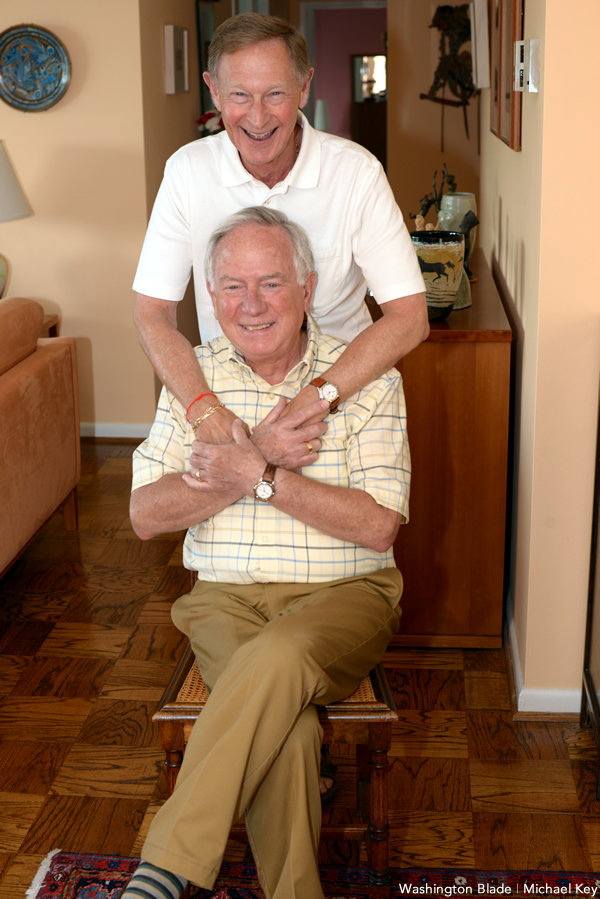
Joel Wind (standing) and Alfred Munzer married in 2013 after more than 30 years together. (Washington Blade photo by Michael Key)
a&e features
Eastern Shore chef named James Beard Finalist
Harley Peet creates inventive food in an inclusive space

In a small Eastern Shore town filled with boutiques, galleries, and the occasional cry of waterfowl from the Chesapeake, Chef Harley Peet is most at home. In his Viennese-inflected, Maryland-sourced fine-dining destination Bas Rouge, Peet draws from his Northern Michigan upbringing, Culinary Institute of America education, and identity as a gay man, for inspiration.
And recently, Peet was named a James Beard Finalist for Best Chef: Mid-Atlantic – the first “Best Chef: Mid-Atlantic” finalist representing the Eastern Shore.
Peet, after graduation from the Culinary Institute of America, took a position as sous chef at Tilghman Island Inn, not far from Bas Rouge. Falling in love with the Eastern Shore, he continued his passion for racing sailboats, boating, gardening, and fishing, and living his somewhat pastoral life as he opened Bas Rouge in 2016 as head chef, a restaurant part of the Bluepoint Hospitality group, which runs more than a dozen concepts in and around Easton, Md.
Coming from a rural area and being gay, Peet knew he had his work cut out for him. He was always aware that the service and hospitality industry “can be down and dirty and rough.”
Now as a leader in the kitchen, he aims to “set a good example, and treat people how I want to be treated. I also want to make sure if you’re at our establishment, I’m the first to stand up and say something.”
The Bas Rouge cuisine, he says, is Contemporary European. “I’m inspired by old-world techniques of countries like Austria, Germany, and France, but I love putting a new spin on classic dishes and finding innovative ways to incorporate the bounty of local Chesapeake ingredients.”
His proudest dish: the humble-yet-elevated Wiener Schnitzel. “It is authentic to what one would expect to find in Vienna, down to the Lingonberries.” From his in-house bakery, Peet dries and grinds the housemade Kaiser-Semmel bread to use as the breadcrumbs.
Peet works to support the LGBTQ community inside and outside of the kitchen. “I love that our Bluepoint Hospitality team has created welcoming spaces where our patrons feel comfortable dining at each of our establishments. Our staff have a genuine respect for one another and work together free of judgment.”
Representing Bluepoint, Peet has participated in events like Chefs for Equality with the Human Rights Campaign, advocating for LGBTQ rights.
At Bas Rouge, Peet brings together his passion for inclusion steeped in a sustainability ethic. He sees environmental stewardship as a way of life. Peet and his husband have lived and worked on their own organic farm for several years. Through research in Europe, he learned about international marine sourcing. Witnessing the impacts of overfishing, Peet considers his own role in promoting eco-friendly practices at Bas Rouge. To that end, he ensures responsible sourcing commitments through his purveyors, relationships that have helped create significant change in how people dine in Easton.
“I have built great relationships in the community and there’s nothing better than one of our long-standing purveyors stopping in with a cooler of fresh fish from the Chesapeake Bay. This goes especially for catching and plating the invasive blue catfish species, which helps control the species’ threat to the local ecosystem.
Through his kitchen exploits, Peet expressed a unique connection to another gay icon in a rural fine-dining restaurant: Patrick O’Connell, of three Michelin starred Inn at Little Washington. In fact, Peet’s husband helped design some of O’Connell’s kitchen spaces. They’ve both been able to navigate treacherous restaurant-industry waters, and have come out triumphant and celebrated. Of O’Connell, Peet says that he “sees [his restaurants] as canvas, all artistry, he sees this as every night is a show.” But at the same time, his “judgment-free space makes him a role model.”
Being in Easton itself is not without challenges. Sourcing is a challenge, having to either fly or ship in ingredients, whereas urban restaurants have the benefit of trucking, he says. The small town “is romantic and charming,” but logistics are difficult – one of the reasons that Peet ensures his team is diverse, building in different viewpoints, and also “making things a hell of a lot more fun.”
Reflecting on challenges and finding (and creating) space on the Eastern Shore, Peet confirmed how important it was to surround himself with people who set a good example, and “if you don’t like the way something is going … move on.”
a&e features
What to expect at the 2024 National Cannabis Festival
Wu-Tang Clan to perform; policy discussions also planned

(Editor’s note: Tickets are still available for the National Cannabis Festival, with prices starting at $55 for one-day general admission on Friday through $190 for a two-day pass with early-entry access. The Washington Blade, one of the event’s sponsors, will host a LGBTQIA+ Lounge and moderate a panel discussion on Saturday with the Mayor’s Office of LGBTQ Affairs.)
With two full days of events and programs along with performances by Wu-Tang Clan, Redman, and Thundercat, the 2024 National Cannabis Festival will be bigger than ever this year.
Leading up to the festivities on Friday and Saturday at Washington, D.C.’s RFK Stadium are plenty of can’t-miss experiences planned for 420 Week, including the National Cannabis Policy Summit and an LGBTQ happy hour hosted by the District’s Black-owned queer bar, Thurst Lounge (both happening on Wednesday).
On Tuesday, the Blade caught up with NCF Founder and Executive Producer Caroline Phillips, principal at The High Street PR & Events, for a discussion about the event’s history and the pivotal political moment for cannabis legalization and drug policy reform both locally and nationally. Phillips also shared her thoughts about the role of LGBTQ activists in these movements and the through-line connecting issues of freedom and bodily autonomy.
After D.C. residents voted to approve Initiative 71 in the fall of 2014, she said, adults were permitted to share cannabis and grow the plant at home, while possession was decriminalized with the hope and expectation that fewer people would be incarcerated.
“When that happened, there was also an influx of really high-priced conferences that promised to connect people to big business opportunities so they could make millions in what they were calling the ‘green rush,'” Phillips said.
“At the time, I was working for Human Rights First,” a nonprofit that was, and is, engaged in “a lot of issues to do with world refugees and immigration in the United States” — so, “it was really interesting to me to see the overlap between drug policy reform and some of these other issues that I was working on,” Phillips said.
“And then it rubbed me a little bit the wrong way to hear about the ‘green rush’ before we’d heard about criminal justice reform around cannabis and before we’d heard about people being let out of jail for cannabis offenses.”
“As my interests grew, I realized that there was really a need for this conversation to happen in a larger way that allowed the larger community, the broader community, to learn about not just cannabis legalization, but to understand how it connects to our criminal justice system, to understand how it can really stimulate and benefit our economy, and to understand how it can become a wellness tool for so many people,” Phillips said.
“On top of all of that, as a minority in the cannabis space, it was important to me that this event and my work in the cannabis industry really amplified how we could create space for Black and Brown people to be stakeholders in this economy in a meaningful way.”

“Since I was already working in event production, I decided to use those skills and apply them to creating a cannabis event,” she said. “And in order to create an event that I thought could really give back to our community with ticket prices low enough for people to actually be able to attend, I thought a large-scale event would be good — and thus was born the cannabis festival.”
D.C. to see more regulated cannabis businesses ‘very soon’
Phillips said she believes decriminalization in D.C. has decreased the number of cannabis-related arrests in the city, but she noted arrests have, nevertheless, continued to disproportionately impact Black and Brown people.
“We’re at a really interesting crossroads for our city and for our cannabis community,” she said. In the eight years since Initiative 71 was passed, “We’ve had our licensed regulated cannabis dispensaries and cultivators who’ve been existing in a very red tape-heavy environment, a very tax heavy environment, and then we have the unregulated cannabis cultivators and cannabis dispensaries in the city” who operate via a “loophole” in the law “that allows the sharing of cannabis between adults who are over the age of 21.”
Many of the purveyors in the latter group, Phillips said, “are looking at trying to get into the legal space; so they’re trying to become regulated businesses in Washington, D.C.”
She noted the city will be “releasing 30 or so licenses in the next couple of weeks, and those stores should be coming online very soon” which will mean “you’ll be seeing a lot more of the regulated stores popping up in neighborhoods and hopefully a lot more opportunity for folks that are interested in leaving the unregulated space to be able to join the regulated marketplace.”
National push for de-scheduling cannabis
Signaling the political momentum for reforming cannabis and criminal justice laws, Wednesday’s Policy Summit will feature U.S. Sens. Raphael Warnock (D-Ga.), Jeff Merkley (D-Ore.), Elizabeth Warren (D-Mass.), and Chuck Schumer (D-N.Y.), the Senate majority leader.
Also representing Capitol Hill at the Summit will be U.S. Congresswoman Eleanor Holmes Norton (D-D.C.) and U.S. Reps. Earl Blumenauer (D-Ore.) and Barbara Lee (D-Calif.) — who will be receiving the Supernova Women Cannabis Champion Lifetime Achievement Award — along with an aide to U.S. Rep. David Joyce (R-Ohio).
Nationally, Phillips said much of the conversation around cannabis concerns de-scheduling. Even though 40 states and D.C. have legalized the drug for recreational and/or medical use, marijuana has been classified as a Schedule I substance since the Controlled Substances Act was passed in 1971, which means it carries the heftiest restrictions on, and penalties for, its possession, sale, distribution, and cultivation.
The U.S. Department of Health and Human Services formally requested the drug be reclassified as a Schedule III substance in August, which inaugurated an ongoing review, and in January a group of 12 Senate Democrats sent a letter to the Biden-Harris administration’s Drug Enforcement Administration urging the agency to de-schedule cannabis altogether.
Along with the Summit, Phillips noted that “a large contingent of advocates will be coming to Washington, D.C. this week to host a vigil at the White House and to be at the festival educating people” about these issues. She said NCF is working with the 420 Unity Coalition to push Congress and the Biden-Harris administration to “move straight to de-scheduling cannabis.”
“This would allow folks who have been locked up for cannabis offenses the chance to be released,” she said. “It would also allow medical patients greater access. It would also allow business owners the chance to exist without the specter of the federal government coming in and telling them what they’re doing is wrong and that they’re criminals.”
Phillips added, however, that de-scheduling cannabis will not “suddenly erase” the “generations and generations of systemic racism” in America’s financial institutions, business marketplace, and criminal justice system, nor the consequences that has wrought on Black and Brown communities.
An example of the work that remains, she said, is making sure “that all people are treated fairly by financial institutions so that they can get the funding for their businesses” to, hopefully, create not just another industry, but “really a better industry” that from the outset is focused on “equity” and “access.”
Policy wonks should be sure to visit the festival, too. “We have a really terrific lineup in our policy pavilion,” Phillips said. “A lot of our heavy hitters from our advocacy committee will be presenting programming.”
“On Saturday there is a really strong federal marijuana reform panel that is being led by Maritza Perez Medina from the Drug Policy Alliance,” she said. “So that’s going to be a terrific discussion” that will also feature “representation from the Veterans Cannabis Coalition.”
“We also have a really interesting talk being led by the Law Enforcement Action Partnership about conservatives, cops, and cannabis,” Phillips added.
Cannabis and the LGBTQ community
“I think what’s so interesting about LGBTQIA+ culture and the cannabis community are the parallels that we’ve seen in the movements towards legalization,” Phillips said.
The fight for LGBTQ rights over the years has often involved centering personal stories and personal experiences, she said. “And that really, I think, began to resonate, the more that we talked about it openly in society; the more it was something that we started to see on television; the more it became a topic in youth development and making sure that we’re raising healthy children.”
Likewise, Phillips said, “we’ve seen cannabis become more of a conversation in mainstream culture. We’ve heard the stories of people who’ve had veterans in their families that have used cannabis instead of pharmaceuticals, the friends or family members who’ve had cancer that have turned to CBD or THC so they could sleep, so they could eat so they could get some level of relief.”
Stories about cannabis have also included accounts of folks who were “arrested when they were young” or “the family member who’s still locked up,” she said, just as stories about LGBTQ people have often involved unjust and unnecessary suffering.
Not only are there similarities in the socio-political struggles, Phillips said, but LGBTQ people have played a central role pushing for cannabis legalization and, in fact, in ushering in the movement by “advocating for HIV patients in California to be able to access cannabis’s medicine.”
As a result of the queer community’s involvement, she said, “the foundation of cannabis legalization is truly patient access and criminal justice reform.”
“LGBTQIA+ advocates and cannabis advocates have managed to rein in support of the majority of Americans for the issues that they find important,” Phillips said, even if, unfortunately, other movements for bodily autonomy like those concerning issues of reproductive justice “don’t see that same support.”
a&e features
Juliet Hawkins’s music defies conventional categorization
‘Keep an open mind, an open heart, and a willingness to evolve’
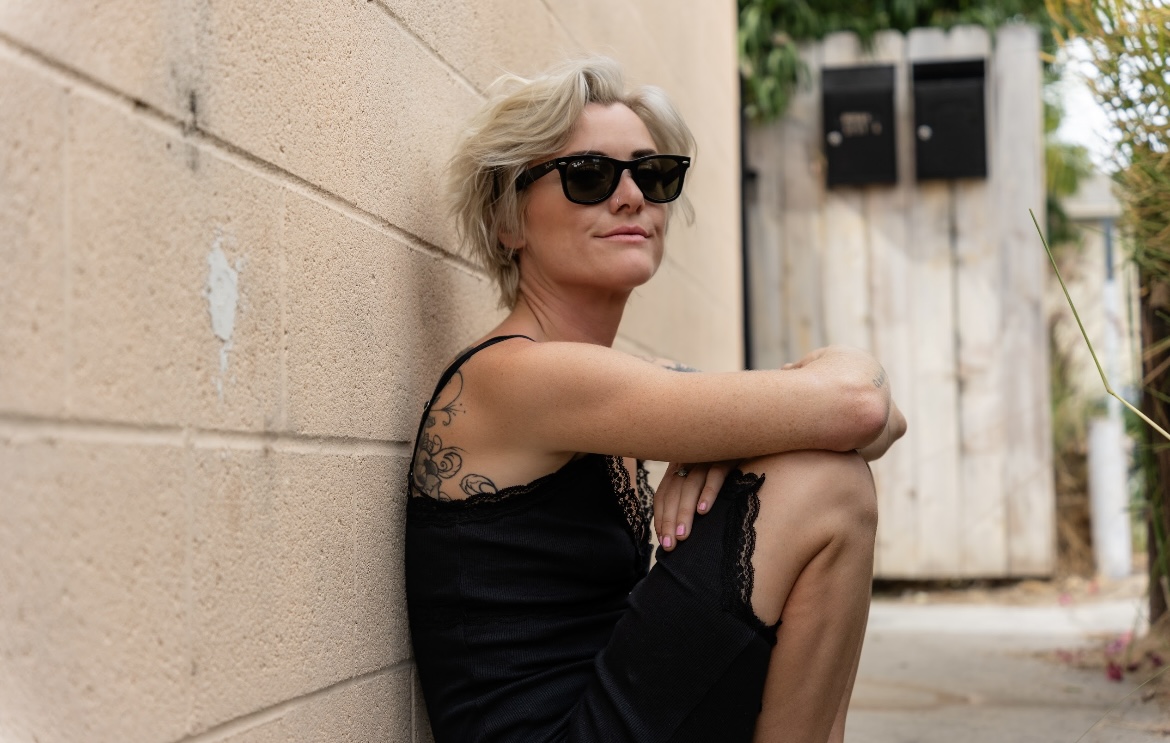
LONG BEACH, Calif. – Emerging from the dynamic music scene of Los Angeles, Juliet Hawkins seamlessly integrates deeply soulful vocals with contemporary production techniques, crafting a distinctive sound that defies conventional categorization.
Drawing inspiration from the emotive depth of Amy Winehouse and weaving together elements of country, blues, and pop, Hawkins’ music can best be described as a fusion–perhaps best termed as soulful electronica. Yet, even this characterization falls short, as Hawkins defines herself as “a blend of a million different inspirations.”
Hawkins’s musical palette mirrors her personae: versatile and eclectic. Any conversation with Hawkins makes this point abundantly clear. She exhibits the archetype of a wild, musical genius while remaining true to her nature-loving, creative spirit. Whether recording in the studio for an album release, performing live in a studio setting, or playing in front of a live audience, Hawkins delivers her music with natural grace.
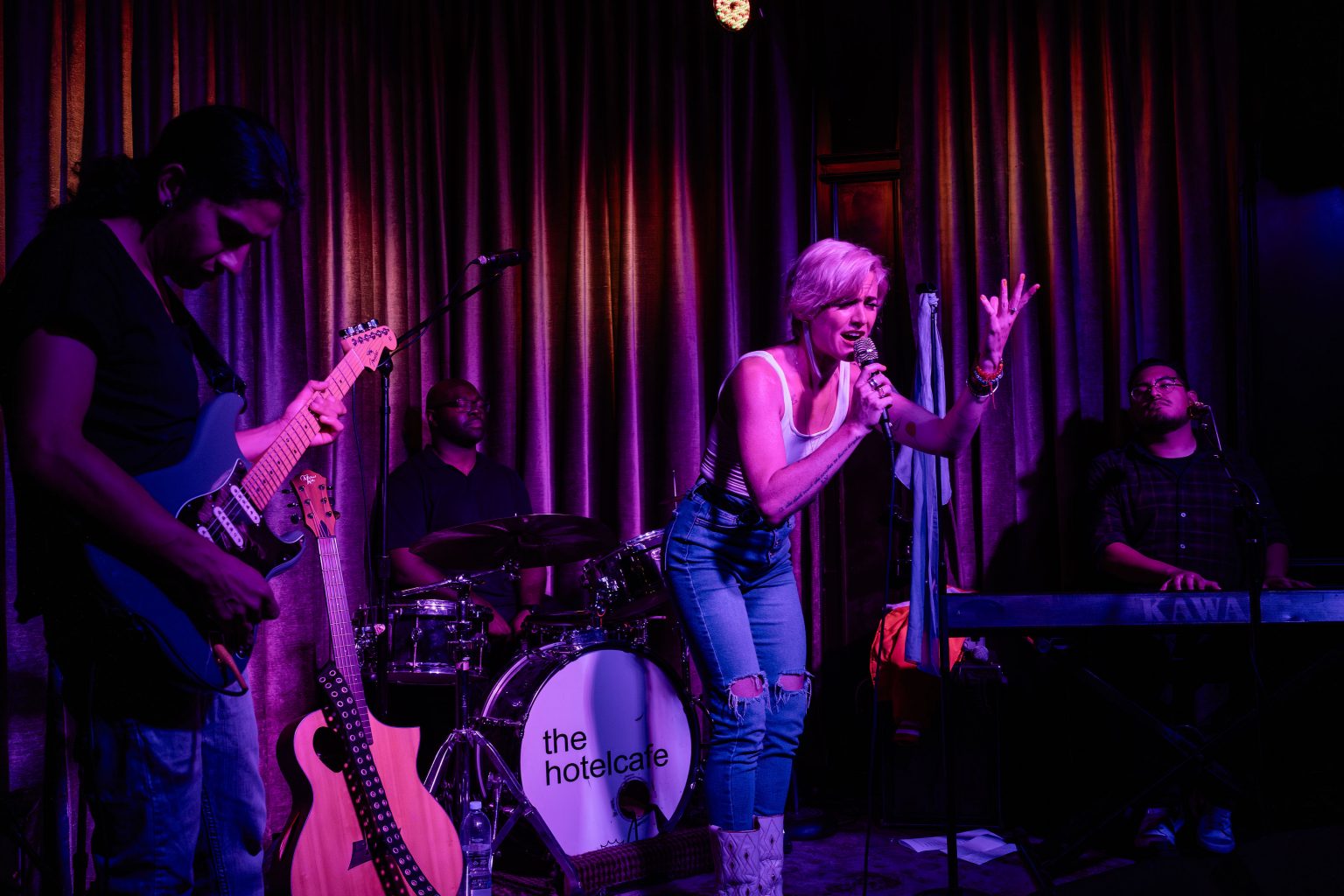
However, Hawkins’s musical journey is far from effortless. Amid personal challenges and adversity, she weaves her personal odyssey of pain and pleasure, transforming these experiences into empowering anthems.
In a candid interview with the Blade, Hawkins spoke with profound openness and vulnerability about her past struggles with opiate and heroin addiction: “That was 10 years ago that I struggled with opiates,” she shared. Yet, instead of letting her previous addiction define her, Hawkins expressed to the Blade that she harbors no shame about her past. “My newer music is much more about empowerment than recovery,” she explained, emphasizing that “writing was the best way to process trauma.”
Despite her struggles with addiction, Hawkins managed to recover. However, she emphasizes that this recovery is deeply intertwined with her spiritual connection to nature. An illustrative instance of Hawkins’ engagement with nature occurred during the COVID pandemic.
Following an impulse that many of us have entertained, she bought a van and chose to live amidst the trees. It was during this period that Hawkins composed the music for her second EP, titled “Lead with Love.”
In many ways, Hawkins deep spiritual connection to nature has been profoundly shaped by her extensive travels. Born in San Diego, spending her formative years in Massachusetts, and later moving to Tennessee before returning to Southern California, she has broadened her interests and exposed herself to the diverse musical landscapes across America.
“Music is the only thing I have left,” Hawkins confides to the Blade, highlighting the integral role that music has in her life. This intimate relationship with music is evident in her sultry and dynamic compositions. Rather than imitating or copying other artists, Hawkins effortlessly integrates sounds from some of her favorite musical influences to create something new. Some of these influences include LP, Lucinda Williams, Lana Del Rey, and, of course, Amy Winehouse, among others.
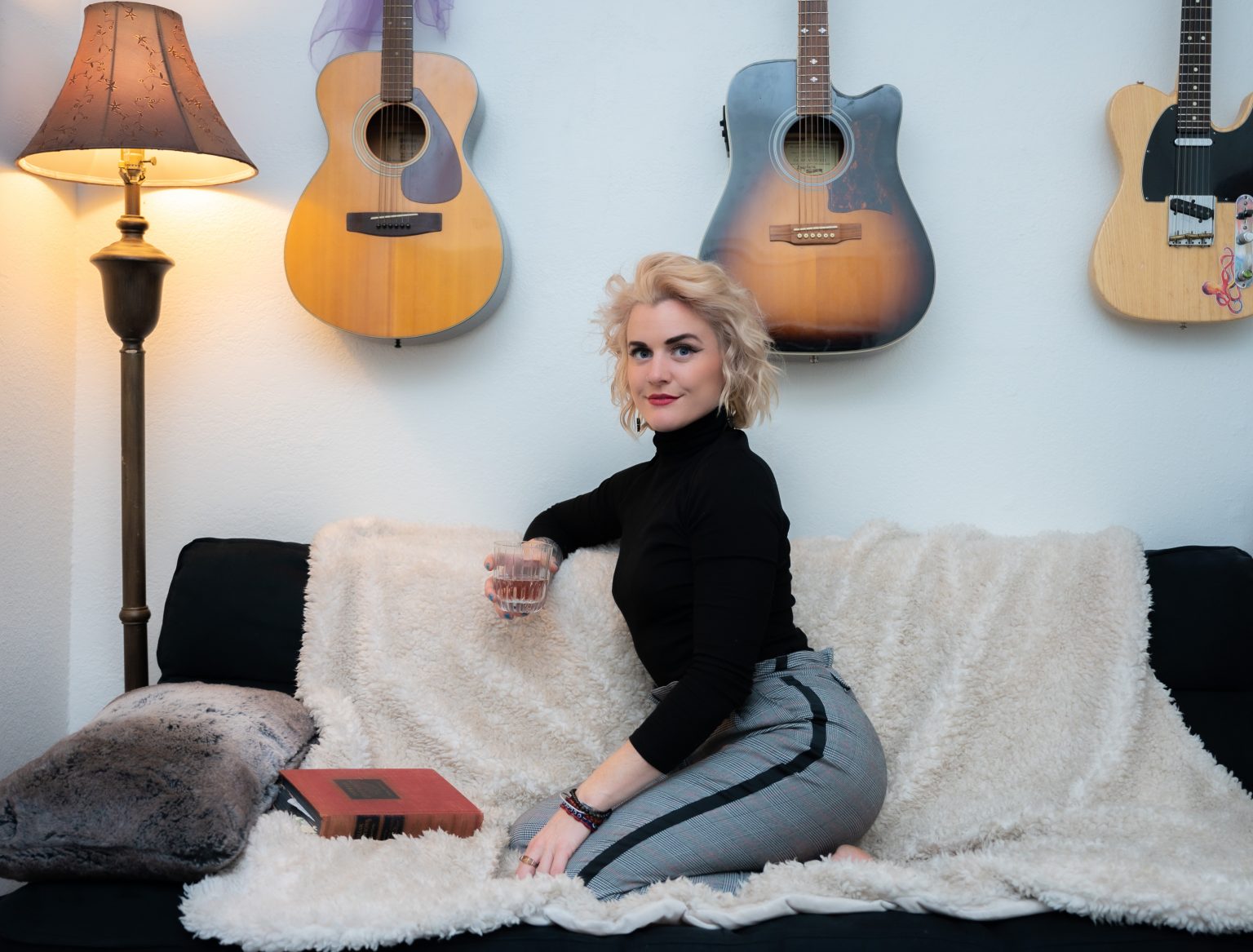
Hawkins has always been passionate about music—-she began with piano at a young age, progressed to guitar, and then to bass, eagerly exploring any instrument she could get her hands on. However, instead of following a traditional path of formalized lessons and structured music theory, Hawkins told the Blade that she “has a hard time following directions and being told what to do.”
This independent approach has led her to experiment with various genres and even join unexpected groups, such as a tribute band for Eric Clapton and Cream. While she acknowledges that her eclectic musical interests might be attributed to ADHD, she holds a different belief: “Creative minds like to move around.”
When discussing her latest musical release — “Stay True (the live album)” which was recorded in a live studio setting — Hawkins describes the experience as a form of improvisation with both herself and the band:
“[The experience] was this divine honey that was flowing through all of us.” She explains that this live album was uncertain in the music’s direction. “For a couple of songs,” Hawkins recalls, “we intuitively closed them out.” By embracing creative spontaneity and refusing to be constrained by fear of mistakes, the live album authentically captures raw sound, complete with background chatter, extended outros, and an extremely somber cover of Ozzy Osbourne’s “Crazy Train” coupled with a slow piano and accompanied strings.
While “Stay True” was a rewarding experience for Hawkins, her favorite live performance took place in an unexpected location—an unattended piano in the middle of an airport. As she began playing Beethoven’s “Moonlight Sonata”, Hawkins shared with the Blade a universal connection we all share with music: “This little girl was dancing as I was playing.”
After the performance, tears welled in Hawkins’ eyes as she was touched by the young girl’s appreciation of her musicianship. Hawkins tells the Blade, “It’s not about playing to an audience—it’s about finding your people.”
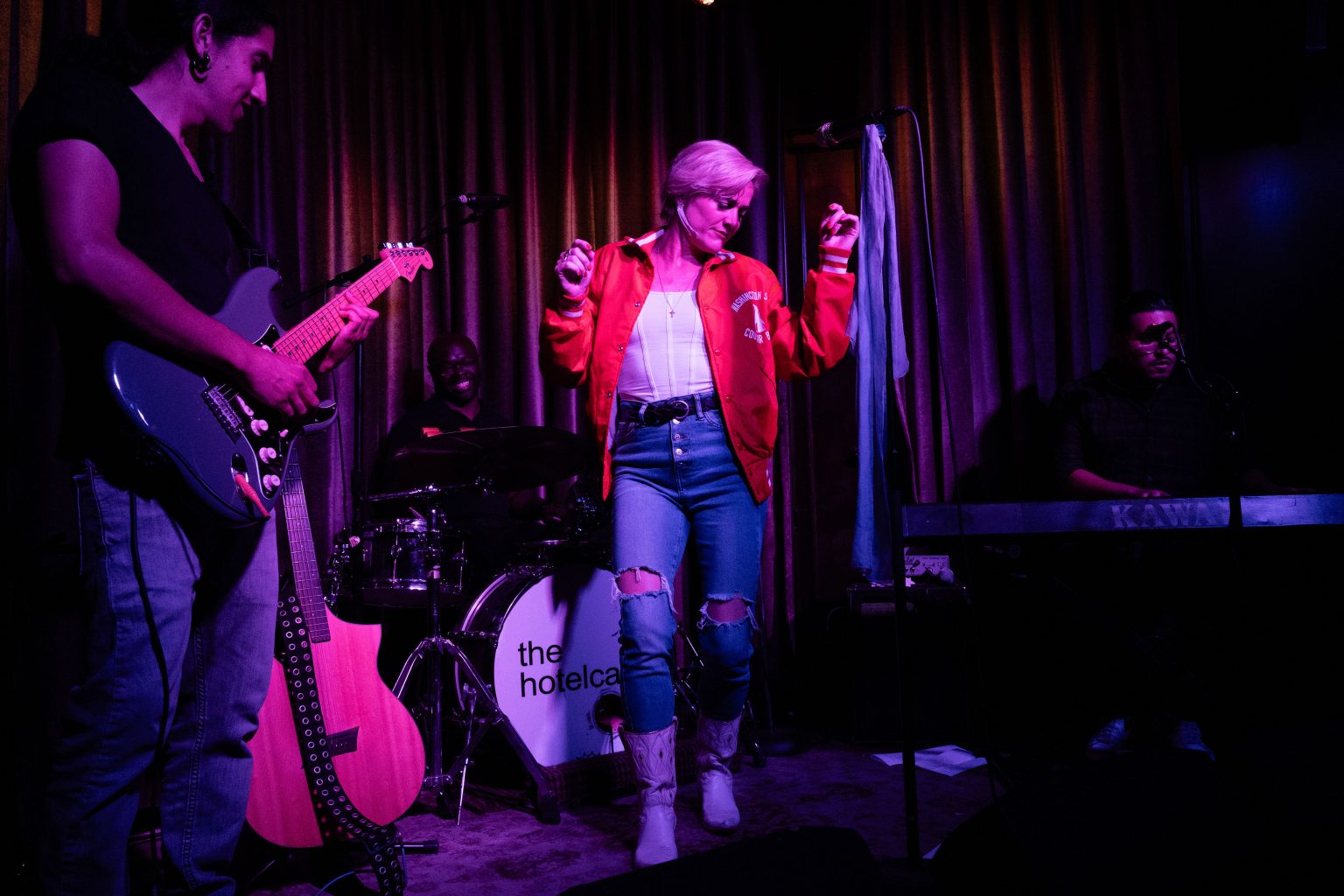
What sets Hawkins apart as an artist is her ability to connect with her audience in diverse settings. She highlights EDC, an electronic dance music festival, as a place where she unabashedly lets her “freak flag” fly and a place to connect with her people. Her affinity for electronic music not only fuels her original pop music creations, but also inspires her to reinterpret songs with an electronic twist. A prime example of this is with her electronic-style cover of Tal Bachman’s 90’s hit, “She’s So High.”
As an openly queer woman in the music industry, Hawkins is on a mission to safeguard artistic integrity. In songs like “My Father’s Men,” she bares her vulnerability and highlights the industry’s misogyny, which often marginalizes gender minorities in their pursuit of artistic expression.
She confides to the Blade, “The industry can be so sexist, misogynist, and oppressive,” and points out that “there are predators in the industry.” Yet, rather than succumbing to apathy, Hawkins is committed to advocating for gender minorities within the music industry.
“Luckily, people are rising up against misogyny, but it’s still there. ‘My Father’s Men’ is a message: It’s time for more people who aren’t just white straight men to have a say.”
Hawkins is also an activist for other causes, with a fervent belief in the preservation of bodily autonomy. Her self-directed music video “I’ll play Daddy,” showcases the joy of embracing one’s body with Hawkins being sensually touched by a plethora of hands. While the song, according to Hawkins, “fell upon deaf ears in the south,” it hasn’t stopped Hawkins from continuing to fight for the causes she believes in. In her interview, Hawkins encapsulated her political stance by quoting an artist she admires:
“To quote Pink, ‘I don’t care about your politics, I care about your kids.’”
When Hawkins isn’t writing music or being a champion for various causes, you might catch her doing the following: camping, rollerblading, painting, teaching music lessons, relaxing with Bernie (her beloved dog), stripping down for artsy photoshoots, or embarking on a quest to find the world’s best hollandaise sauce.
But at the end of the day, Hawkins sums up her main purpose: “To come together with like-minded people and create.”
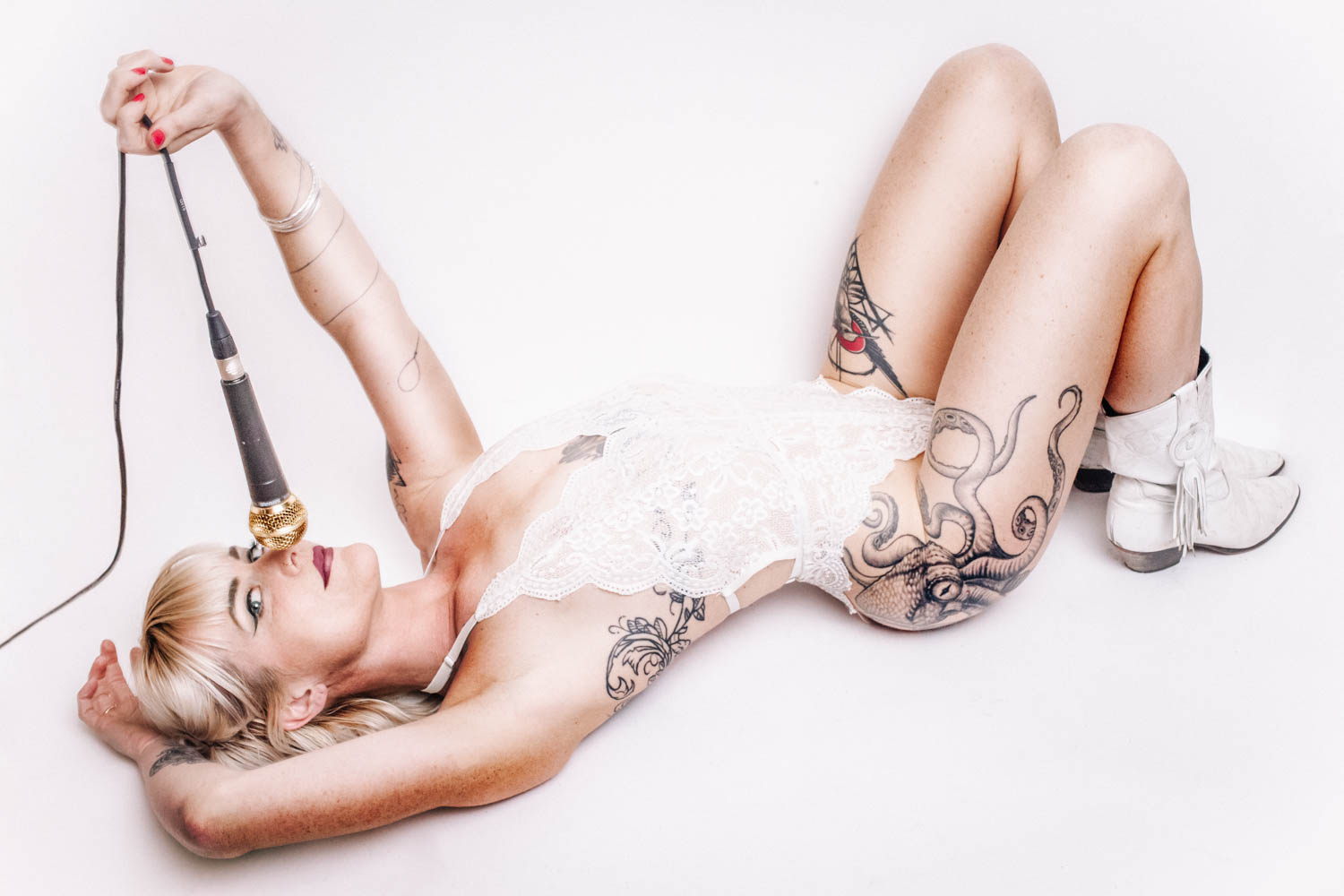
Part of this ever-evolving, coming-of-age-like journey includes an important element: plant-based medicine. Hawkins tells the Blade that she acknowledges her previous experience with addiction and finds certain plants to be useful in her recovery:
“The recovery thing is tricky,” Hawkins explains, “I don’t use opiates—-no powders and no pills—but I am a fan of weed, and I think psilocybin can be helpful when used at the right time.” She emphasizes the role of psychedelics in guiding her towards her purpose. “Thanks for psychedelics, I have a reignited sense of purpose … Music came naturally to me as an outlet to heal.”
While she views the occasional dabbling of psychedelics as a spiritual practice, Hawkins also embraces other rituals, particularly those she performs before and during live shows. “I always carry two rocks with me: a labradorite and a tiger’s eye marble,” she explains.
-

 State Department3 days ago
State Department3 days agoState Department releases annual human rights report
-

 Maryland5 days ago
Maryland5 days agoJoe Vogel campaign holds ‘Big Gay Canvass Kickoff’
-

 District of Columbia1 day ago
District of Columbia1 day agoCatching up with the asexuals and aromantics of D.C.
-

 Politics4 days ago
Politics4 days agoSmithsonian staff concerned about future of LGBTQ programming amid GOP scrutiny












